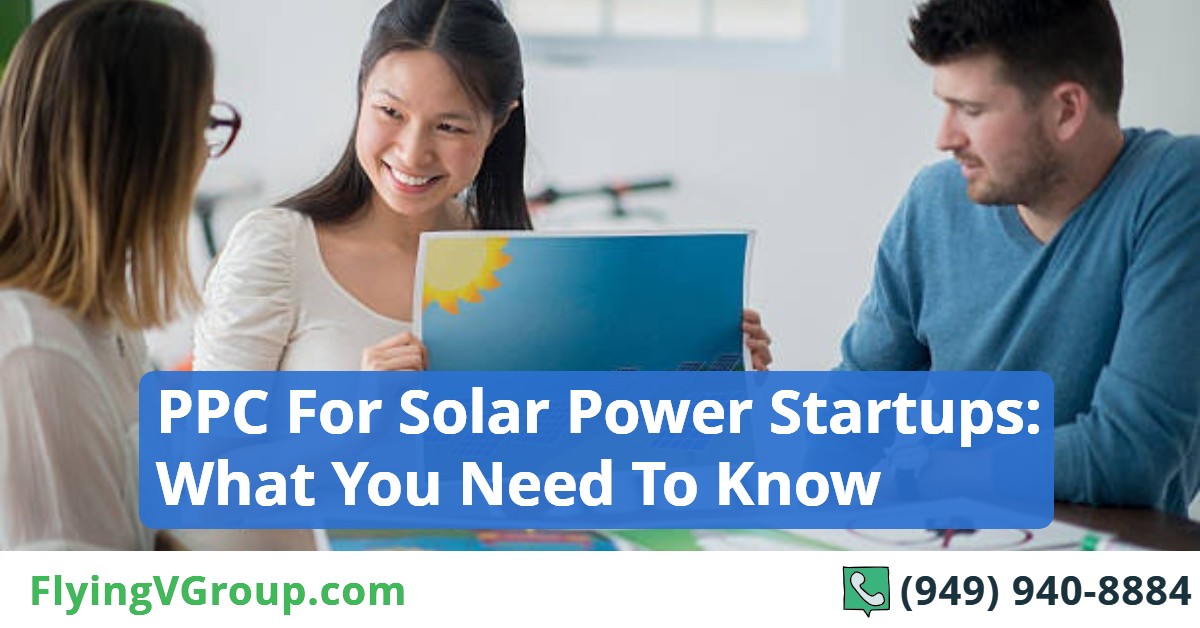With the global climate conditions worsening, everyone is looking into renewable sources of energy. Among the many natural fuels, solar energy is gaining the most popularity. We could say that solar energy is the future.
Why? Because every year, more people are buying solar panels for their homes and businesses. That’s why so many startups are looking to invest in solar power.
You did well by diving into this ever-growing market. If you’re looking for which advertisement strategy would help you get customers and close more leads, then you’ve come to the right place.
In this article, we’ll go over everything you need to know about PPC marketing for solar power startups: what it is, how it works, and why your company needs it.
Let’s get started.
- PPC Marketing For Solar Power Startups
- What is PPC
- Types of PPC Campaigns
- Why Businesses In The Solar Industry Need PPC
- Should My Solar Company Invest In Local SEO Or PPC?
- Advantages Of PPC For Growing Solar Companies
- Different Kinds of Solar Power Services You Can Run Ads on
- How to Run a Successful PPC Campaign
- A Few Key Takeaways For PPC And Solar Power Startups
PPC Marketing For Solar Power Startups
PPC marketing is a great way to get your business noticed, and it’s also one of the most cost-effective ways to generate leads.
You can use it to sell products and services, build brand awareness, or get your business noticed on a local level.
Pay Per Click (PPC) is when you pay for every click that goes through your website.
This will help you get more traffic and leads than organic search engine optimization alone, because ads are placed at the top of search results in Google Adwords, Bing Ads, or Yahoo Search Marketing platforms.
When someone clicks on an ad, they are directed straight away to your website. This is where they either buy something from you or sign up for a free trial offer if they’re interested in learning more about what you do before committing their hard-earned money!
What is PPC
PPC is short for pay per click. It’s a form of online advertising where you pay for each click on your link, so if someone clicks on it, you make money. Another name for PPC is paid ads, and it’s also called cost-per-click or CPC.
PPC has been around since the beginning of the internet, but it’s now more popular than ever. In fact, approximately half of all people who use the internet have used PPC in some way!
There are many reasons why businesses choose to advertise using PPC:
You can choose exactly who sees your ad and when they see it—so if you want to advertise during work hours only or only during specific days of the week, then that’s possible!
You can control how much you spend on each campaign. Depending on your budget, you can manually choose your ad bid as well as how long the ad should run. This helps you display your ads according to your budget.
Even though you pay for every click you get from your ad, there are differences in the pricing of each type of PPC ad.
Types of PPC Campaigns
Pay-per-click (PPC) advertising means that you pay each time a user clicks on your ad. You’re only charged when someone clicks, so it doesn’t matter if they don’t convert.
Pay-per-impression advertising involves paying a certain amount for every one thousand times an ad is shown in its entirety or partial form. With pay-per-impression ads, it doesn’t matter whether your ad was seen by humans or only robots and spiders from search engines that crawl through web pages. As long as it was shown to 1000 “people”, you’ll be charged for it.
Cost-per-action means that you pay each time your customers do something specific, such as sign up for newsletter subscriptions or make purchases through your store via PPC ads.
This type of advertising is more expensive than others because there’s little risk involved for the marketer since you’re paying only after the customer takes an action. This kind of advertisement protects you from traffic that won’t convert or click frauds.
Apart from PPC ads, there are many forms of advertising, such as direct mail and social media advertising. So, why do we argue that your solar industry needs PPC?
Why Businesses In The Solar Industry Need PPC
With PPC, you can test a variety of different keywords and ad copy to see what works best for your business. This is especially important in an emerging industry like solar power because there are no clear trends yet.
You can try out different keywords, find what works best, and then use this data to inform your long-term strategy.
PPC is also a great way to reach large audiences – not just those searching for “solar panels” or “green energy.”
You can target specific regions or cities that may be interested in renewable energy but don’t necessarily have the infrastructure available at the moment.
When considering your renewable energy marketing strategy, you might ask yourself…
Should My Solar Company Invest In Local SEO Or PPC?
If your company is serious about online marketing, PPC is a great place to start. With the right strategy and execution, it can provide you with a steady stream of qualified leads for your business.
SEO is a good way to attract customers, but PPC is more effective in this regard. SEO helps drive traffic to your website; however, it doesn’t compel viewers to take action (like filling out a form) as often as PPC does.
Also, since SEO takes time and effort before any results are seen, as opposed to PPC, where you can start driving traffic to your startup in no time, it makes sense that you should invest more heavily in paid marketing than organic search engine optimization (SEO).
Advantages Of PPC For Growing Solar Companies
PPC is an effective way to reach your target audience. PPC allows you to target specific keywords and even specific geographical locations, making it easy for you to get in front of people who are likely interested in what you’re selling.
You can also scale your campaigns quickly and easily by targeting more and more keywords, which will help keep costs down while increasing the number of prospects that see your ads.
PPC is a great way to drive traffic to your website.
The most popular form of pay-per-click advertising—Google AdWords—allows businesses like yours to bid on keywords that their potential customers might be searching for online, then run these ads next to search results when those people click one of them (or anywhere else on the page).
When someone clicks through on one of these ads, they’re sent directly back over to your website where they’ll hopefully stick around long enough to read something interesting or eventually make a purchase!
PPC is a great way to build brand awareness. Since most companies spend between 10% – 15% of their marketing budgets on PPC advertising (accordingly to how much money they can afford), it’s no wonder why so many solar power startups are turning towards this medium as their main form of online presence management!
In addition, there’s another reason why we recommend using PPC for your renewable energy marketing strategy; because it actually works!
If marketers were spending millions upon millions each year trying something which did not work well enough, then obviously, companies wouldn’t continue investing so heavily into things such as Facebook Ads or Google AdWords campaigns.
But as long as these types continue seeing success rates upwards of 90% annually, then surely there must be something worthwhile about them.
In fact, recent research shows that 92% percent consider digital advertising channels important sources when deciding what brands/products to buy next time around (data courtesy Nielsen), which means consumers really enjoy seeing advertisements while browsing websites based largely on shopping activities like Amazon Marketplace portals etcetera – meaning its worth putting some effort into it.
PPC allows you to run ads for various service aspects of your solar power startup.
Different Kinds of Solar Power Services You Can Run Ads on
Solar power services are basically a combination of the 3 main types of solar power products: installation, repair, and maintenance.
Solar power installation services is a broad term that covers anything related to setting up an efficient system for your home or business. This may include design and engineering work as well as the actual construction of the solar panels themselves.
Solar power repair and maintenance services cover any repairs needed after an installation has been made. This could be something as simple as tightening up loose screws on an array or replacing a faulty inverter in the system’s control equipment.
It can also include troubleshooting problems that arise during regular use of your new solar energy source (such as unusual fluctuations in performance).
Solar products are one category among many that make up this industry—but it’s probably the most important one!
Many startups have been founded solely to sell these products because they’re generally easier to get started with.
Now that you know why you should consider PPC, let’s dive into how you can actually run a successful PPC campaign for your solar power startup.
How to Run a Successful PPC Campaign
To make your PPC campaign a success, you need to do the following:
Start With Your Website
When your customers click on your ad, it means that they’re interested in what you have to offer and want to know more about it. Your ads would be directing your leads to your website.
Therefore, make sure that your landing pages are addressing what’s displayed in the ads. If not, then we can bet that your ad would attract leads, but none of them would convert into sales.
One more thing… kindly don’t forget to implement all your on-page SEO tactics. It’ll pay dividends in the long run.
Find a Bidding Strategy
Alright. You’ve set up and optimized your website to entice your leads to hang out there longer. It’s time to find a bidding strategy.
The bidding for PPC ads is in the form of manual and automatic bids. Go for manual bids if you’re new in the PPC world or you have a limited budget. But if you have a little more to spend and you want extra features, then by all means go for the automatic bids.
The bottom line for selecting either of them is to look at your campaign goals and determine which one would help you reach them faster.
Set Your Budget
Keeping your budget margin in mind when doing PPC is very important because it helps you know how long your ads would run and exactly the type of paid ads you’ll use.
The good thing about paid ads is that you can start with a very small budget. This is good for when you’re just starting out or want to test the waters of PPC.
After you’ve tested and are convinced that you’ll get a high ROI on your ads, then you can decide to increase the budget.
Make Keyword Research for Your Ad
Keyword research is very essential if you want your ads to be shown to qualified leads. Without keywords, Google may not even know where to place your ads.
However, if you perform keyword research and target rankable keywords, then you can be guaranteed more traffic, views, clicks, and conversions.
Write a Persuasive copy
As much as the website and keyword research is important, the kind of copy on the ad should be given equal attention.
Your ad copy would make or break your campaign. It’ll determine whether your leads would click on them or not.
No matter what happens, make sure the copy of your ad is clear, concise, relevant, and promises a solution. In short, write a persuasive and irresistible copy.
If you can’t write it yourself, invest in a good copywriter to get it done for you. After all, what’s the point in running an ad that nobody clicks on.
Analyze Your Ad Results and Adjust Accordingly
Congratulations, your ad is live! But we’re not done yet. After a few weeks, it is recommended that analyze the performance of your ads and see if they’re working, and adjust based on your findings.
The solar industry is booming so it’s important to make sure you’re using the right marketing techniques.
The renewable power industry is growing at a faster rate. Hence it’s important to use the right marketing techniques in order to reach potential customers.
If you’re looking for PPC marketing help, look no further than Flying V Group. We’ll help you find the best keywords and monitor your ads so they don’t run out of budget or become ineffective.
A Few Key Takeaways For PPC And Solar Power Startups
As it turns out, PPC for solar power startups is an excellent strategy for reaching your target audience. If you’re looking to get your brand in front of specific people who are already interested in solar power, PPC may be a great fit for you.
So don’t write off PPC just because it doesn’t sound like your ideal strategy! As long as there are searches related to what your company offers, there are opportunities for paid ads on Google.
However, if you’re looking for ways to help spread awareness and educate people who aren’t familiar with solar energy yet (whether because they don’t know about its benefits or simply haven’t heard about it), then Facebook might be a better platform for you than AdWords.
SHARE THIS POST
Thank you so much for reading PPC For Solar Power Startups: What You Need To Know . We really appreciate it! If you have any questions about our article, or can suggest any other topics you think we should explore, feel free to let us know.
Be sure to sign-up for our newsletter to receive monthly emails on all of the latest trends and happenings in the digital marketing space. You will also receive our FREE E-Book with the Amazing Marketing Tools for Powerful Business Growth. Sign-up below!
Also, if you received some value out of this article, please share with your friends or colleagues, or leave a comment/question below. We really appreciate you reading our blog and every share/comment means the world to us and allows us to continue producing valuable tools to help you grow your business!






0 Comments